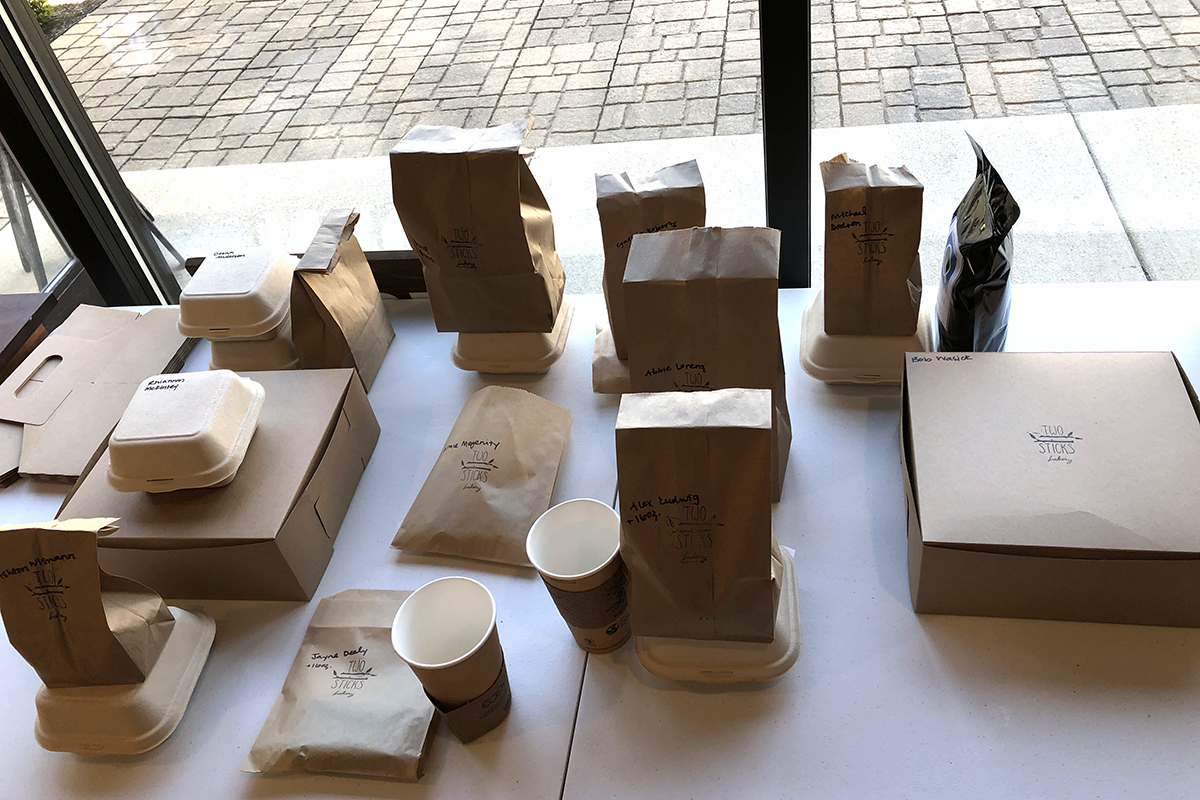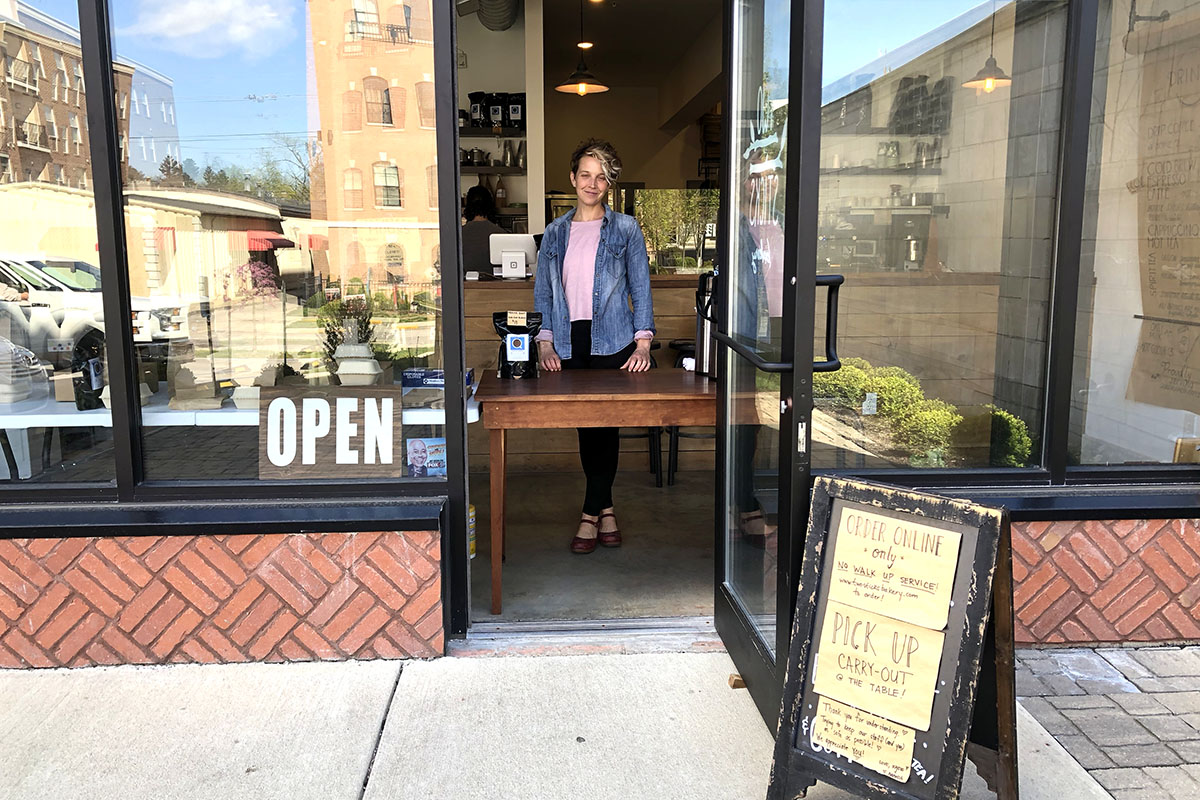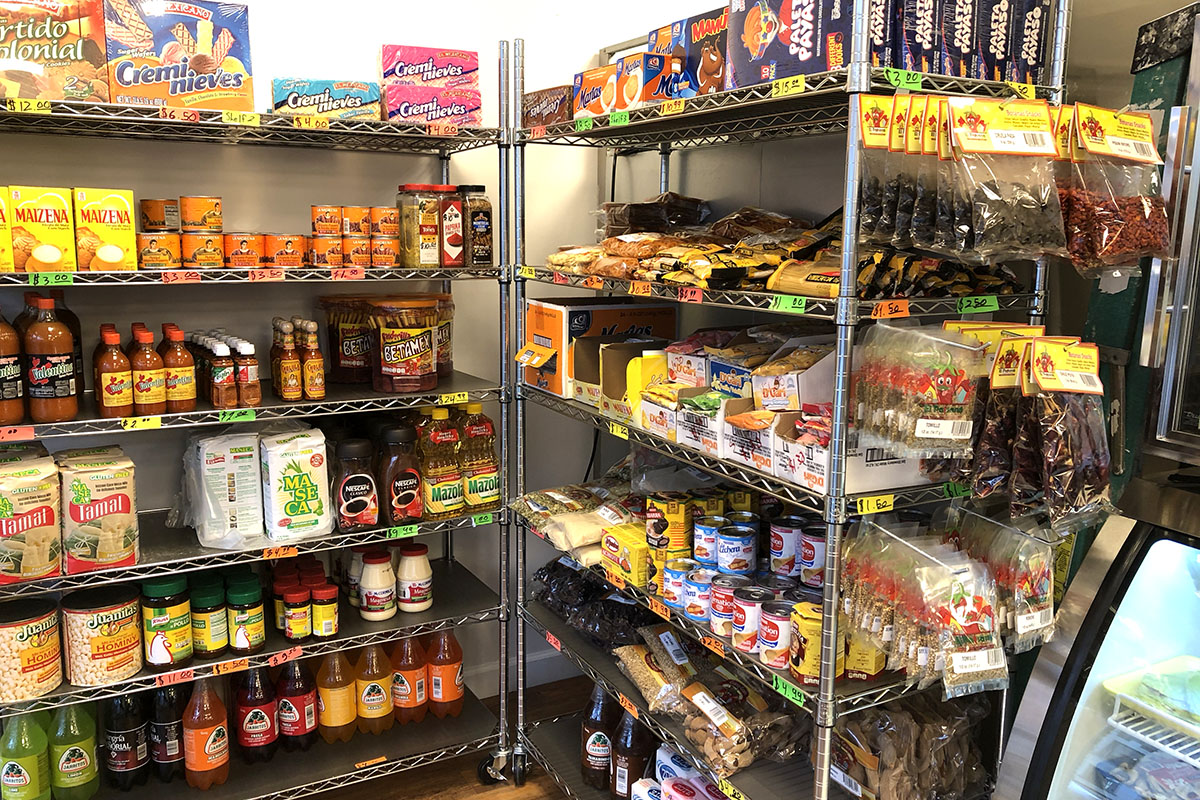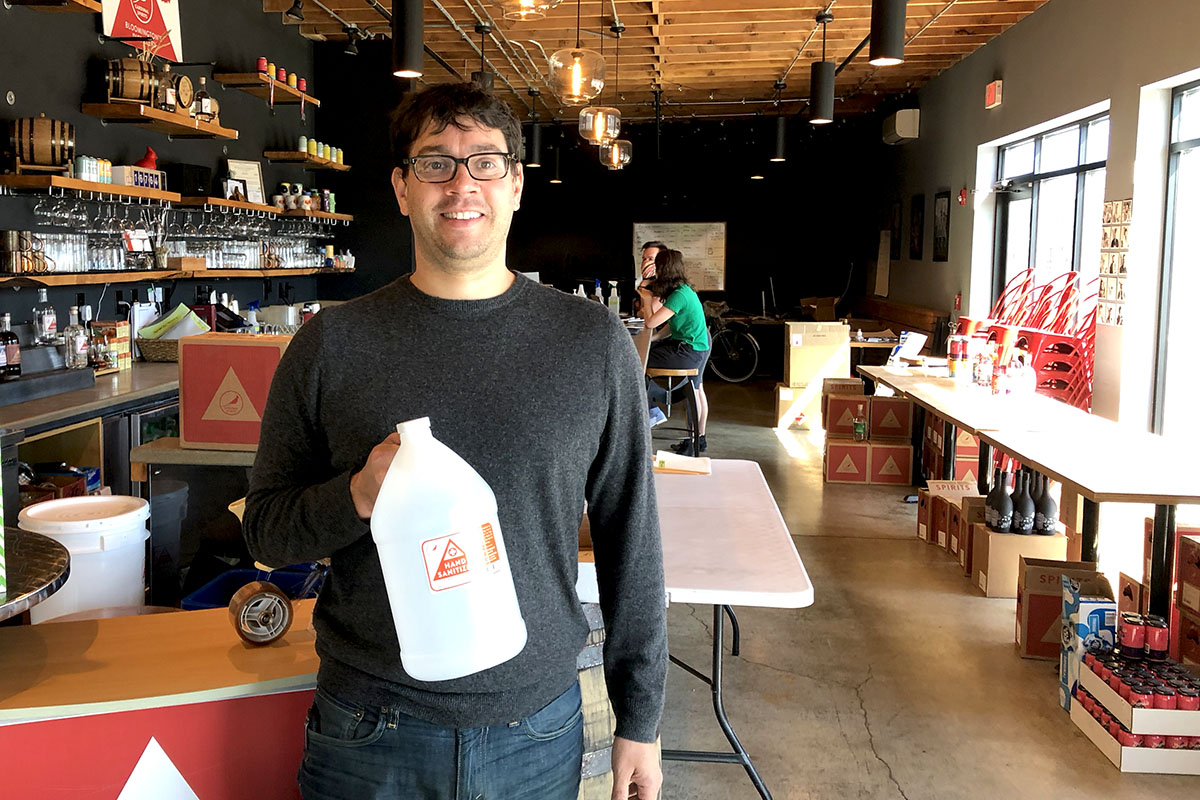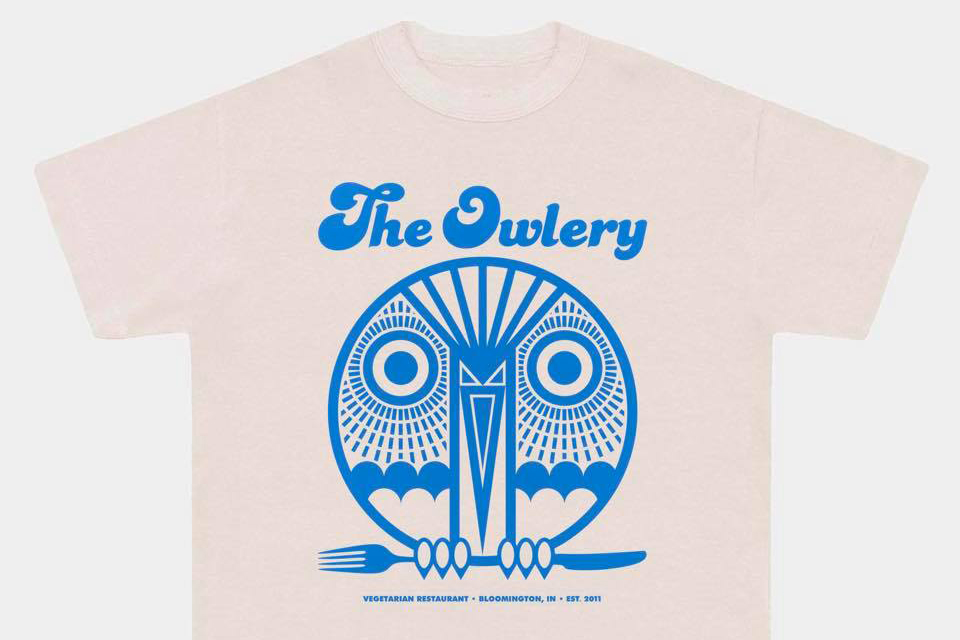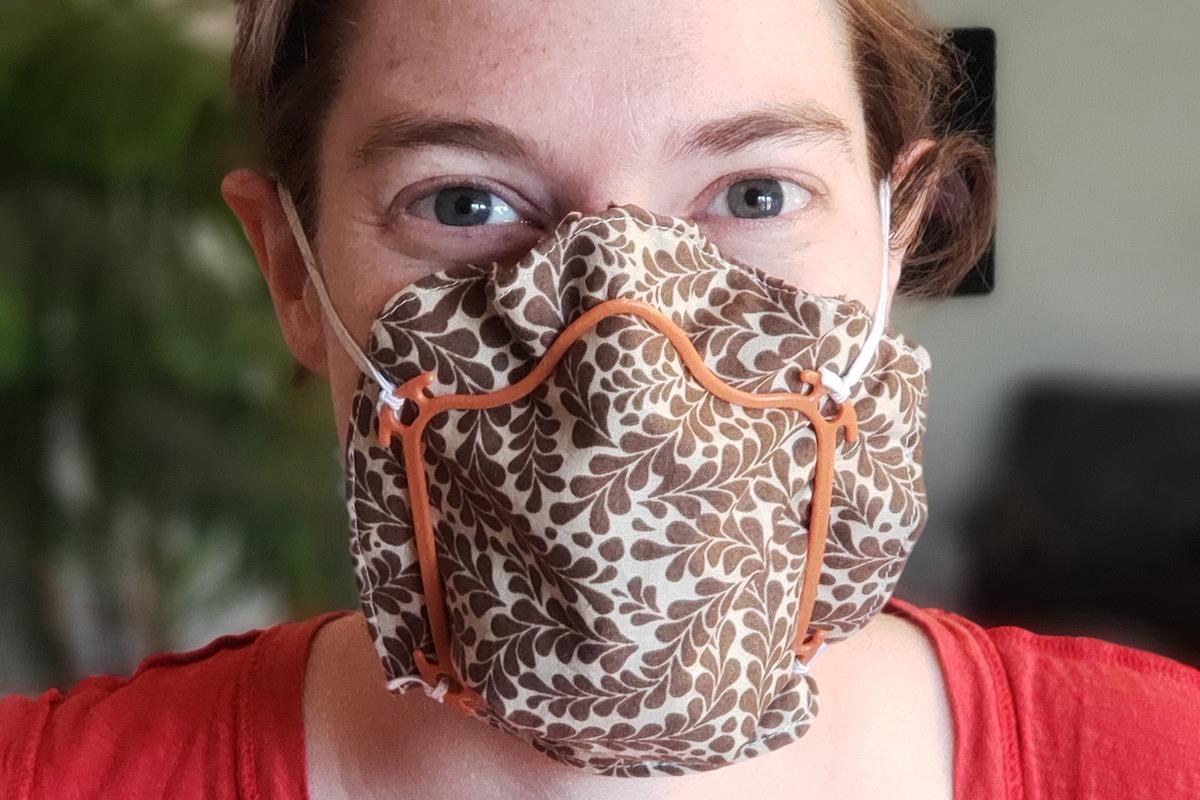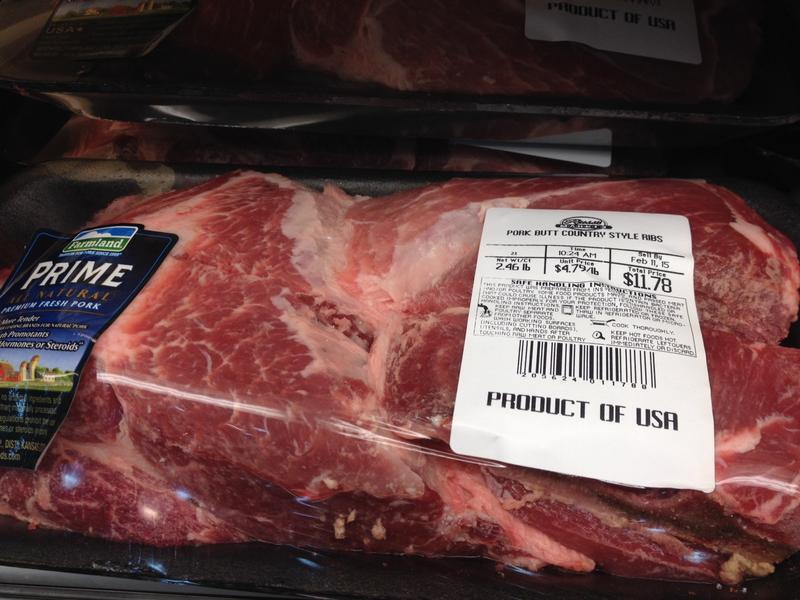KAYTE YOUNG: Production support comes from Bill Brown at Griffy Creek Studio, architectural design and consulting for residential, commercial and community projects. Sustainable, energy positive and resilient design for a rapidly changing world. Bill at GriffyCreek.studio. And Insurance agent Dan Williamson of Bill Resch Insurance. Offering comprehensive auto, business and life coverage, in affiliation with Pekin Insurance. Beyond the expected. More at 812-336-6838.
(Earth Eats Theme Music)
KAYTE YOUNG: [Narrating] From WFIU in Bloomington Indiana, I'm Kayte Young and this is Earth Eats. This week on our show we're hearing stories from the local food scene here in Bloomington Indiana. From coffee shops to garden towers to tacos and bakeries. We're asking how businesses are adjusting to the COVID-19 restrictions. Stay with us.
President Trump has signed an executive order to shore up the country's meat supply. That comes after thousands of meat packing workers have contracted COVID-19 causing some plants to shut down even as others remain open.
Meat packing companies have put a hodge-podge of safety measures in place in response to the outbreak. As Harvest Public Media's Christina Stella reports, some employees still worry about their health.
CHRISTINA STELLA: [Narrating] When employees of the Smithfield plant in Crete Nebraska clock in, they might pass a flyer taped up by the locker room. Some will stop to read it, if it’s in their language. Hundreds will miss it while hustling to work. According to employees, this is how Smithfield communicates with its staff during a pandemic.
ANONYMOUS WORKER: I just feel that's wrong. You walk by it, you read it, if you don't see it, then you don't get the information.
CHRISTINA STELLA: [Narrating] That's a worker at the Smithfield plant, she didn't want her name being used for fear of losing her job. Workers and advocates across the region say companies haven’t been clear with workers about how the pandemic is affecting their plants. She says that's made a scary few weeks even harder to navigate.
ANONYMOUS WORKER: Communication is a big key during something like this. I am very grateful that I am working, and I have a job right now, but it's just very stressful.
CHRISTINA STELLA: [Narrating] Nebraska's COVID-19 policies don't include large employers, like meat packers. Eric Reeder, President of Local United Commercial Food Workers 293 wonders if that's because some policies, like social distancing, or relaxing attendance rules, could hurt a company's bottom line.
ERIC REEDER: Unless you lay off workers and slow the lines down, it's very difficult to be able to separate action on the line. And I think that at times production takes a primary focus over worker safety.
CHRISTINA STELLA: [Narrating] Until recently, there weren't any federal or state safety guidelines for meat packers. Reeder says policies initially ran the gambit.
ERIC REEDER: None of this is uniform. We were negotiating with each plant, and so we end up with this hodge-podge. At every location it's different in some way.
CHRISTINA STELLA: [Narrating] Those discrepancies have impacted workers in various ways. Some packers issued raises, and others gave out extra sick pay, no questions asked. Some like JBS and Grand Island Nebraska, initially wanted a positive COVID-19 test, and rolled out bonuses for anybody who didn't miss work during the pandemic. At least 40% of the area's cases are now tied to that plant.
One cargo worker in central Nebraska was sent home for two weeks for coughing at work. She also didn't want her name used for fear of losing her job. She didn't have COVID-19, but was told the company only offers 10 days of pandemic leave.
ANONYMOUS WORKER 2: We did have to cut back into my savings to actually make it through the week. And now I have nothing. I paid my bills, and my car payment, and now I’m waiting on next week's paycheck. And I'm lucky if I'm gonna get one.
CHRISTINA STELLA: [Narrating] Now if she actually gets sick, she has no safety net. That's a terrifying prospect for many workers.
ANONYMOUS WORKER 2: We don't want to take it home to our families, but we can't go without a paycheck either. We wash our hands so many times a day, I think my hands are honestly cracking.
CHRISTINA STELLA: [Narrating] Micky Devitt labor advocacy group Heartland Worker Center hears similar stories all the time. She says getting information to workers about policies in outbreaks is high stakes. It’s about more than just workers.
MICKY DEVITT: If employees don’t know what the agreements are, and it's behind closed doors, what these conversations are covering, there's not accountability to the employees and there’s not transparency to the public about what is going on in these meat packing plants that we're all relying on.
CHRISTINA STELLA: [Narrating] In a pandemic the fate of any meat packing town is tied to what's happening at the plant. Plant closures are devastating to towns and national supply chains. That's why officials like Nebraska Governor Pete Ricketts, wants to keep them open. And some advocates say closures could have been avoided if companies had done more sooner, either on their own or at the urging of officials.
Now that many meat packing plants are COVID-19 hotspots, companies and local health officials are scrambling to contain the outbreaks. And in late April, the CDC recommended companies' separate workers, install physical barriers and expand sick leave policies.
But workers are still frustrated that they haven't been included in those conversations around their own safety. Now for themselves and their families, all they can hope is that they don't get sick. Christina Stella, Harvest Public Media.
KAYTE YOUNG: Find more from this reporting collective at HarvestPublicMedia.org.
(Somber Piano Music)
While it may be next to impossible for workers in meat packing plants to keep a safe distance at work, locally, food businesses are insisting on practices to keep their workers from contracting or spreading COVID-19.
This week on Earth Eats were hearing from several local food businesses about adjustments they've made in response to the restrictions. Though restaurants and cafes can no longer host customers inside, since they provide food, they are allowed to offer take out and delivery. When things started to shift in mid-March, Two Sticks Bakery on South Washington in Bloomington, quickly moved to take-out only, and closed down their seating area.
AMANDA ARMSTRONG: People were still entering the space, and so I realized that this wasn't going to last. And we either needed to decide to close, or we were going to have to go online. The week earlier I was like "I do not know how to set up an online store; I am not setting up an online store" and literally that Sunday, the 22nd, I was like "We have to do this; we have to at least try."
KAYTE YOUNG: [Narrating] That's Amanda Armstrong, co-owner of Two Sticks. They use Square for their point of sale service, and Square has an online store system.
AMANDA ARMSTRONG: So, I spent Monday playing around with it, figuring it out. Tuesday we opened with online ordering.
KAYTE YOUNG: [Narrating] They quickly moved to taking orders exclusively online.
AMANDA ARMSTRONG: Which was frustrating for people who didn't know and would just come, or if they're older, or if they don't have internet access. It would be sometimes hard to explain.
KAYTE YOUNG: [Narrating] It had to be all or nothing, both to reduce physical contact, but also to keep track of their inventory in their system.
AMANDA ARMSTRONG: So, we're just completely online orders only at this point. No phone call orders as well.
KAYTE YOUNG: [Narrating] The next question, how's business?
AMANDA ARMSTRONG: So, we have kind of a goal number in our mind. We know what that number is that we need in order to make a profit, not just break even, but make it worthwhile to be open.
So, that whole first week I was definitely paying attention to the numbers, and we exceeded them every single day. And every day since then it has been amazing. Like, extraordinary numbers for regular times, let alone carry-out only, quarantine times. It's been incredible, incredible.
KAYTE YOUNG: [Narrating] A few days after this interview they posted on Instagram - a request for patience from customers. Apparently Two Sticks sells out on their online store within minutes of opening at 7:30am.
In a way, it's a good problem to have. But it makes for some unhappy customers and some of them are quite vocal. Luckily there's plenty of grateful and supportive customers too, who are just happy that Two Sticks is making it work in the midst of a pandemic.
And speaking of making it work...
PILAR GONZALES: We're still in business [Pilar laughs].
KAYTE YOUNG: [Narrating] Pilar Gonzales, of Phili's Party Tacos has made some changes and remains open in downtown Bloomington. They have a taco truck parked outside of their recently opened storefront on South Walnut. Their storefront offers groceries, so customers are allowed to enter the store to shop for food. But to keep things contact free, they have a new payment system.
ARMANDO GONZALES: Touchless, you put a card close to it and it will take the payment.
KAYTE YOUNG: [Narrating] That's Armando Pilo Kito, Pilar's husband who’s also involved in the business. So you can stop by their spot at 109 South Walnut to place your taco order, and while you're there you can pick up some spices and other ingredients for Mexican cuisine, or choose from a selection of Mexican breads and pastries from Indianapolis. They're also taking orders over the phone.
PILAR GONZALES: They call me-
ARMANDO GONZALES: They call, we get it ready. We don't have any delivery service, we don't know how to navigate in that area. We only have pickup.
KAYTE YOUNG: [Narrating] Pilar says she doesn't want to have to charge more for deliveries, or use a delivery service where customers would have to pay more. She knows that a lot of people are short on cash right now and she wants her food to remain affordable. Business is definitely down by 50-70%. They would normally be entering the busy season for food trucks as the weather warms and outdoor events are planned.
PILAR GONZALES: Before this happened, we started hiring a lot of people for events coming.
KAYTE YOUNG: [Narrating] In recent weeks, a couple of apartment complexes in town have invited them to bring their food truck to the parking lot to serve residents for lunch. This has worked out well with everyone observing the social distancing and getting a break from working in their home offices.
The storefront which they're calling Phili's Party Deli, had only been open for about three months and they were beginning an expansion of the space to the room next door.
ARMANDO GONZALES: Applying for this other space is to have more seating area, tables, where you could actually sit, and you know chat with somebody in front of you.
KAYTE YOUNG: [Narrating] Ironic that they were in the midst of making a space for people to gather and sit together while enjoying their tacos when a pandemic hit, shutting down that possibility, before they'd even placed the chairs and tables.
After a short break we'll talk with Jeff Grant form Hopscotch Coffee, about the significance of tables and chairs for his business. Stay with us.
[Earth Eats Production Support Music]
Production support comes from:
Bloomingfoods Coop Market, providing local residents with locally sourced food since 1976. Owned by over 12,000 residents in Monroe County and beyond. More at Bloomingfoods.Coop.
Elizabeth Ruh, Enrolled Agent with personal financial services. Assisting businesses and individuals with tax prepration and planning for 15 years. More at PersonalFinancialServices.net. And Bill Brown at Griffy Creek Studio, architectural design and consulting for residential, commercial and community projects. Sustainable, energy positive and resilient design for a rapidly changing world. Bill at GriffyCreek.studio.
[Transition Music]
Hopscotch Coffee on the B-line trail in Bloomington is a place where meeting, sitting together, and enjoying a carefully curated interior space is part of the vision. Jeff Grant co-owner of Hopscotch and Rainbow Bakery has been asking himself tough questions about what remains when you strip that away.
JEFF GRANT: It just really makes it all about the product and to some degree the service, whereas we've always taken a great point of pride in like our interiors and creating exciting comfortable place to be. It's just interesting when that's completely removed. I came down here one night and it removed about half of the chairs so that our guests could space out.
KAYTE YOUNG: [Narrating] At first, they thought they could set up the cafe for social distancing.
JEFF GRANT: Coming down here at night and taking out chairs, it just felt antithetical to what we do here, which is try to fill seats, and have this be a place people can meet up with their friends. So yeah, coming here at the dark of night and taking the chairs around was...it was emotional. It was hard to do. It felt like I was also sabotaging our operation here.
Pretty soon after that within a day or two, we decided we needed to just fully shut down. You know, kind of strategize rather than just keep making adjustments on the fly and try to educate ourselves as much as we could as to how we could be safe. When we're closed for those two weeks, we spent one of those weeks just kind of sitting around, confused about what to do. It wasn’t like we closed down and we immediately went to action. We were stressed out and unsure of how to proceed. It was like you woke up in the morning feeling like you had an idea of the best way to proceed and by the time we went to bed it was just... everything was up for reconsideration. We were depressed. Like we're not our normal somewhat cheery selves. You know, just kind of like making the best of this situation like... it was tough.
KAYTE YOUNG: [Narrating] When they opened back up, they did so with extreme caution. Employees had the option to stay home if they chose, and they took all the precautions to keep staff and customers safe. They take orders and payments online or over the phone. They prepare the orders and customers pick up on the covered patio. It's a two-person operation, with one employee in the middle of the room near the door, and a barista preparing the drinks behind the counter. They can carry out the process while maintaining the required distance between each other and with customers. The orders are placed on the table on the patio and the employee goes back inside behind a closed door. All staff wear masks and gloves.
JEFF GRANT: Because we serve food, we were declared essential, and luckily able to open back up. But even that was something we questioned, we were like "Okay, well legally we're essential, but are we? Like is it worth it?" We've had customers that work at the hospital that we're able to talk to and they were very reassuring, saying you know, "No, this is helping people cope. And it’s really helping people get through the day" and that really feels important right now, if we can do that in a safe manner. I don't know how to say this but like our customers are... you know, the regulars that we, so we appreciate them on that level, but it also feels like a really specific cross section of people that come here. We're not a Kroger. We don't see everybody. You know we see a variety, a diversity of people here. These are our friends, it's our business community and it felt like more than that. So, I thought of like directly all of those people in danger... it just didn't seem, like anything we wanted to play around with.
KAYTE YOUNG: [Narrating] Just down the trail from Hopscotch is Cardinal Spirits. I spoke with co-owner Jeff Wulsich about how they have adapted to the new conditions.
JEFF WULSICH: You know we've been fortunate here at Cardinal Spirits, we've always done some carry-out. And we've had our bottles to-go, and bottled cocktails to-go, and cans to-go. So, we were able to pivot pretty quickly to that.
KAYTE YOUNG: [Narrating] They also quickly began making hand sanitizer.
JEFF WULSICH: As soon as we saw that we had the ingredients, and that there's starting to be a shortage on it, we started making it. We've been able to give it out for free to individuals still, every day. We give out free small bottles or they can fill up their own bottle, and then we've been able to provide to first line responders, initially for free as well. And then now we're in a position to make enough that if organizations can buy it, we ask them to pay for it, and that helps pay for our labor, our workforce of course, and then allows us to keep giving it out for free. Initially we were making it from our own high-proof spirits, which was expensive and painful [laughs]. And now we're making it from denatured spirits ,and it’s an alcohol that has an additive in it that makes it very bitter so that people wouldn't drink it. So, it's really preventing kids or anybody else from alcohol poisoning. So, it tastes really terrible, but that's okay cause you know, we're not drinking it. It's unusually for Cardinal Spirits to make something that tastes terrible but... uh here we are. We've been able to source that as actually made in Indiana; we're getting it by the tanker. We got a tanker this morning and we're able to use that in our products.
KAYTE YOUNG: [Narrating] The other strategy they adopted was to announce on social media the minimum they needed to sell each day to keep going.
JEFF WULSICH: Here's the bottles and the canned cocktails, and the cocktail to-go mixtures that will keep our team employed. We set those goals early in the morning and then we let people when we've met those goals and we say "You know what, we're good, go support another local business. You know our costs are covered. Thank you for the support." Almost every day we've met our goal. There was one day that we didn't meet our goal and it was okay because we also did a huge giveaway. Big Red Liquors had given us $5000 to hand out hand sanitizer. I mean we had a line down the street handing out gallon jugs and small bottles. And I think that may have kept some of our regular customers away. So, that was like the only day we didn't get it, but I think the rest of the time we've been really very fortunate to be meeting our goals.
And with that plus the hand sanitizer, we feel like we've been in a good position to support our employees and the community.
KAYTE YOUNG: [Narrating] Bottles of alcohol and canned cocktails work really well as take-out items. A hot plate of vegetarian poutine? Not so much.
TOBY FOSTER: To me, going out to eat is about the whole experience of going to eat. It's not just picking up some food.
KAYTE YOUNG: Toby foster is one of the owners of The Owlery, a vegetarian restaurant on the square in downtown Bloomington. Toby doesn't believe what they have to offer in their cozy spot translates well to a take-out model.
TOBY FOSTER: The whole reason that we wanted to open a restaurant and do a restaurant in the first place is because we like going out to eat, and I think we have a great wait staff. I think that we have a really inviting atmosphere, I think we have a great beer selection. The feeling of everybody being there working a busy shift and getting people, getting people their food right when it's made, and you know having that like, team spirit kind of thing that happens in a restaurant on the good nights, you know , is really great. I don't know, it's just not very fun to go to work and you know, you make something, and it's good, and it's hot, and then you put it in a box and watch it sit on the table for 25 minutes until somebody comes to pick it up. And you're just thinking like, "Wow that sandwich was probably really good 30 minutes ago." And then they come, and you have to still charge them $11 or whatever.
KAYTE YOUNG: [Narrating] He was also unhappy with all the disposable packaging they were sending out the door, and more importantly he wasn't certain that they could run a take-out operation while keeping the employees and customers safe from contracting or spreading the virus.
TOBY FOSTER: We, you know, have delivery people coming in. So, we can do a lot to try to keep everything safe but then you still have to have these other people coming in, that have been to... you know, who knows how many restaurants between here and Indianapolis, or here and Chicago.
KAYTE YOUNG: [Narrating] So, after trying takeout for two days, when the stay-at-home order came down from the Governor, they decided to completely close.
TOBY FOSTER: Really, I think that everyone, at least as far as they expressed to me was pretty on board with that decision. I think a lot of people already had expressed to us that they didn't want to be working, either because they were nervous about getting the virus, or had family members that they were nervous about spreading it to, or things like that. So, like I said most people seemed to think it was the right call.
KAYTE YOUNG: [Narrating] Toby Foster and co-owner Ryan Woods advised their staff on applying for unemployment. They also organized an online fundraiser, selling totes and t-shirts with an original design from a former employee. Toby says they have strong customer support and people were very generous. They raised around $6,000 and distributed it between their employees. I spoke with Willow Leganza, an IU student who works at the Owlery. She said the extra cash came in handy during those weeks before the stimulus check arrived, and unemployment kicked in. She was worried about having to use to money she'd been saving for medical expenses. But money wasn't the only issue for her.
WILLOW LEGANZA: I felt frustrated and a little at lost cause, I live just in a studio apartment and it's on the ground floor, so it’s just one room. And as things got more and more locked down, I started feeling like a little more and more stir crazy. It felt kind of strange waking up to the same wall every day. I miss going to work, I miss seeing all of my coworkers, and like I love all of them a lot. So, it's kind of sad. It's kind of sad that such a crucial point of social interaction for me. That's really the best job I ever had. I every time go in there I just see a bunch of people that I like, and I get to say everybody, and everybody works really well together. So, I feel really grateful for that place, so it's sad. It's really sad not being able to go there. But luckily I have family up in Indianapolis, and just a day or two ago I just like threw a bunch of clothes in my car and called them and made sure, I was like,"Hey, have we all been quarantined?" and they were like "Yes, we would love it if you came up." So, luckily I’ve been able to come up here and stay with them and that has been super nice.
KAYTE YOUNG: [Narrating] She's been busy with school work, playing guitar, reading, and taking long walks. Her semester will be over soon, and she'll have more time to kill.
WILLOW LEGANZA: I’m really looking forward to when the Owlery can open again.
KAYTE YOUNG: [Narrating] Since the restaurant is completely closed, the Owlery can keep expenses pretty low and hopefully ride this out. Toby talked about some ideas they're tossing around if the shutdown goes on too much longer.
TOBY FOSTER: We talked about maybe doing some sort of like, pre-ordered meals where once or twice a week we do like kind of big family style things that people could pick up. So, that's maybe something that we would think about, think about moving towards in the future.
KAYTE YOUNG: [Narrating] He's thinking of a model that would allow for just one weekly supply delivery or grocery store run. Where they aren't wasting food and maybe packing meals in larger containers so there's less disposable packaging. I asked Toby how he was feeling.
TOBY FOSTER: I feel like there's not a whole lot I can really do about it. And I am, I think I’m fairly good at accepting situations that I can't do anything about. So, I'm just trying to let myself be patient and know that we'll figure something out. We're at the point where, I don't know, at the point where that's possible.
[Serene Transition Music]
KAYTE YOUNG: [Narrating] We've been talking with food and beverage producers, but another industry that has noticed a shift during the pandemic is garden suppliers. I spoke with Joel Grant, Co-founder and CEO of the garden tower project here in Bloomington, about an uptick in garden supply sales, and a new product they brought online in recent weeks.
JOEL GRANT: The garden towers an organic matter recycling, food growing, vegetable, and herb, and greens growing machine.
KRISTI ARMES: It's roughly four feet tall once it's assembled. It's terracotta colored and it's scalloped, it’s a circle, but it's got bumps that come out that allow... that's where the pockets are that allow you to grow. And it's got a pretty highly engineered base that allows the whole top of the unit to rotate 360 degrees. So, you can optimize for sun if you're in an area that's only part sun, or is shaded part of the day. And then it has a drawer on the bottom that captures all of the overwater so to speak. And that's a pretty nutrient liquid. And you use that to then pour back over the top of the tower, so you don't lose any of the nutrients. It takes roughly six cubic feet of soil. And then there's a tube the center with a lot of holes in it for the worms and that's for the red wiggler worms and the vermicomposting. That's about the garden tower, the product. But the garden tower project as a company has a mission to try to create products and ideas that will make sustainable gardening available to everybody, no matter where they live.
KAYTE YOUNG: [Narrating] That's Kristi Armes. She's the COO of the garden tower project. The latest iteration of the garden tower is manufactured here in Indiana using an injection mold process. When the coronavirus hit the U.S. and Joel heard that there was a shortage of protective equipment such as face masks, he started reviewing what was happening in the open source 3D printing community.
JOEL GRANT: The DIY tech community, these millions of 3D printers, and engineers at all different levels, completely amateur to the most professional, started looking for solutions and designing their own solutions.
KAYTE YOUNG: He saw a product called a mask frame, that seemed to work well. A mask frame is a thin frame of plastic that holds a piece of cloth or filter material close to a user's face, without needing to sow a mask. It can be reused by simply replacing the cloth or filter material. Blue shop towels work really well. Joel saw the design and he knew that it could be really adapted to injection mold production.
JOEL GRANT: And 3D printing is very slow, a molded part can be made in a fraction of a minute instead of 15 or 15 minutes plus. It can also be made less expensively. The material is less money and these presses can run all day long and it's what they're made to do.
KAYTE YOUNG: [Narrating] So, he contacted one of their manufacturing partners in Columbus Indiana. They were up and running within two weeks of deciding on the design. The product took off and since then they have been full steam ahead trying to keep up with demand. When we spoke a couple of weeks ago, they had shipped more than 20,000 orders. In addition to the face mask frames, their garden supply business has doubled this season. The garden towers were on backorder when we spoke. Joel says he and the team at the Garden Tower Project are happy to be able to contribute and to make a difference. Joel says he’s grateful for the entire Garden Tower Team for making this happen and to Mark Fuller, the open source engineer in Cincinnati, who developed the design for this mask.
[Earth Eats Theme Music]
We are out of time sadly. Next week we'll hear from more folks from the local food scene, including Jeff Mease from One World Food Enterprises. And we'll talk with Eric Schedler of Muddy Fork Bakery about the many changes they've made to their business model. Thanks for listening, I hope you'll join us next week.
RENEE REED: The Earth Eats team includes Eoban Binder, Chad Bouchard, Mark Chilla, Abraham Hill, Taylor Killough, Josephine McRobbie, Daniel Orr, The IU Food Institute, Harvest Public Media and me, Renee Reed. Our theme music is composed by Erin Tobey and performed by Erin and Matt Tobey. Earth Eats is produced and edited by Kayte Young and our executive producer is John Bailey.
KAYTE YOUNG: Production support comes from Insurance agent Dan Williamson of Bill Resch Insurance. Offering comprehensive home, auto,business and life coverage, in affiliation with Pekin Insurance. Beyond the expected. More at 812-336-6838. Bloomingfoods Coop Market, providing local residents with locally sourced food since 1976. Owned by over 12,000 residents in Monroe County and beyond. More at Bloomingfoods.Coop. And Elizabeth Ruh, Enrolled Agent, providing customized financial services for individuals, businesses, disabled adults including tax planning, bill paying, and estate services. More at PersonalFinancialServices.net.







